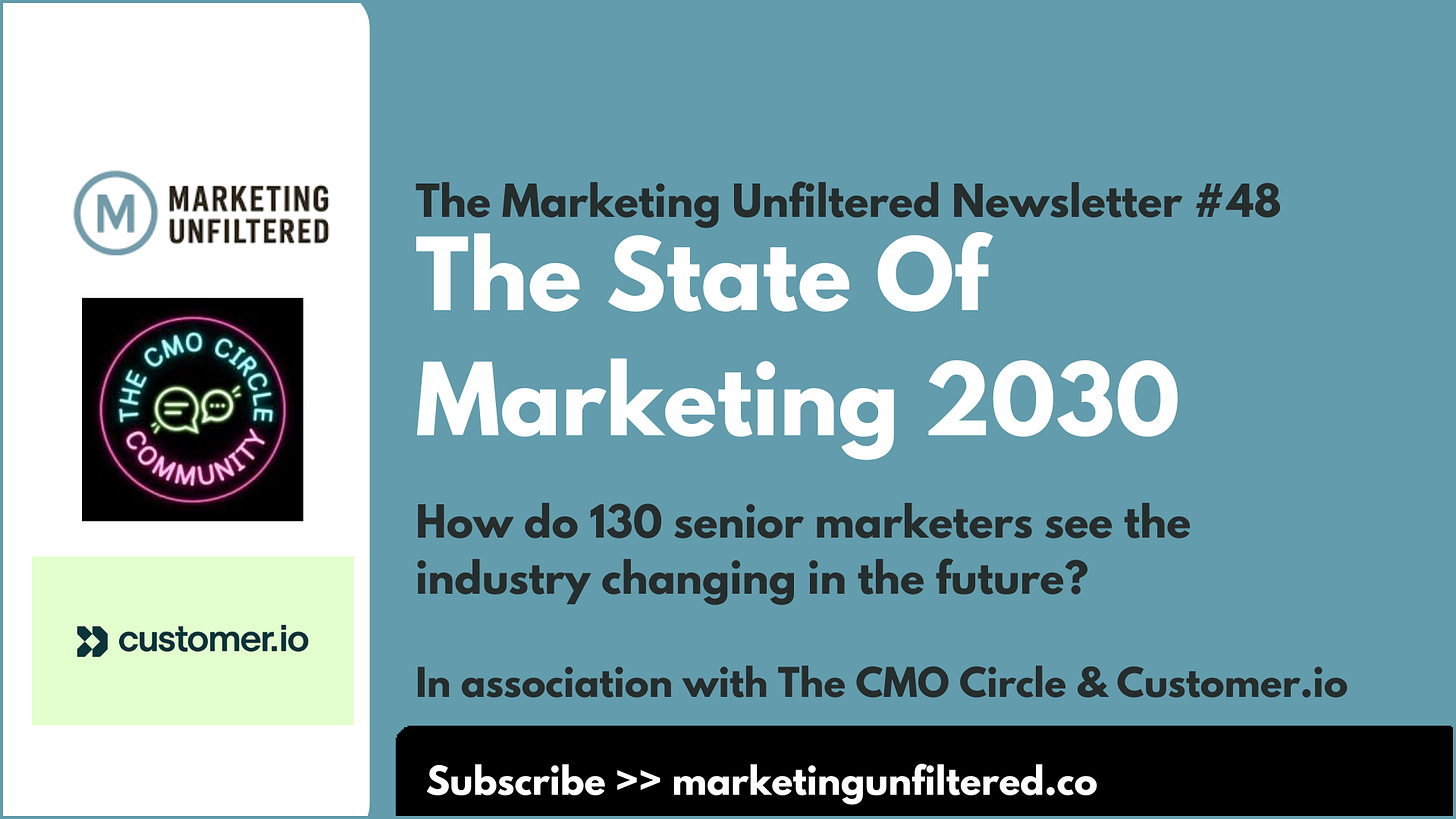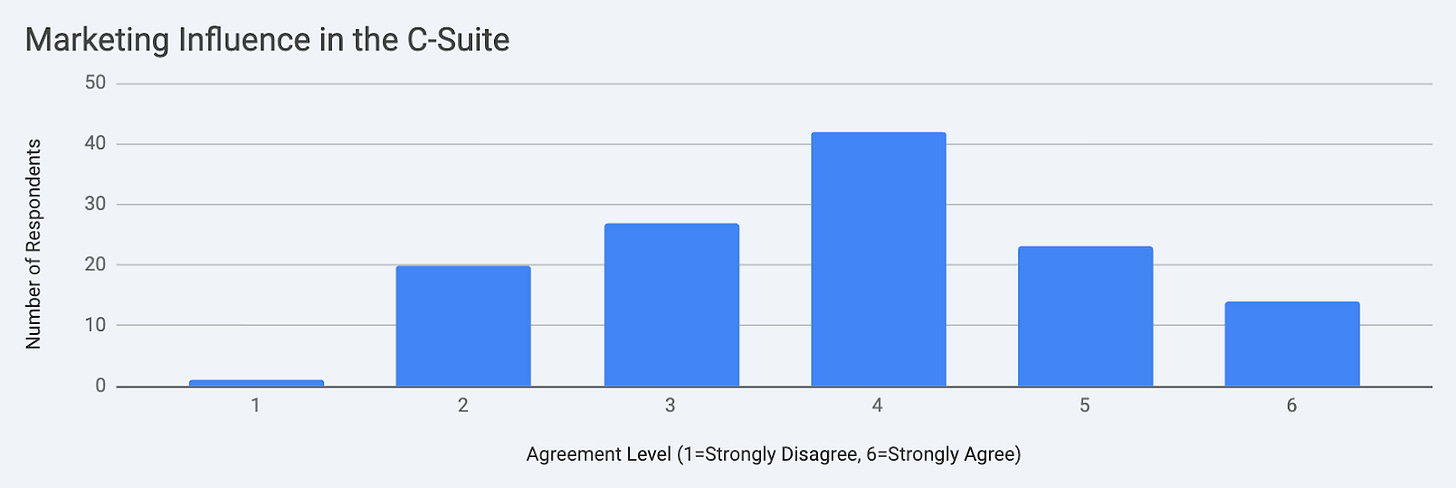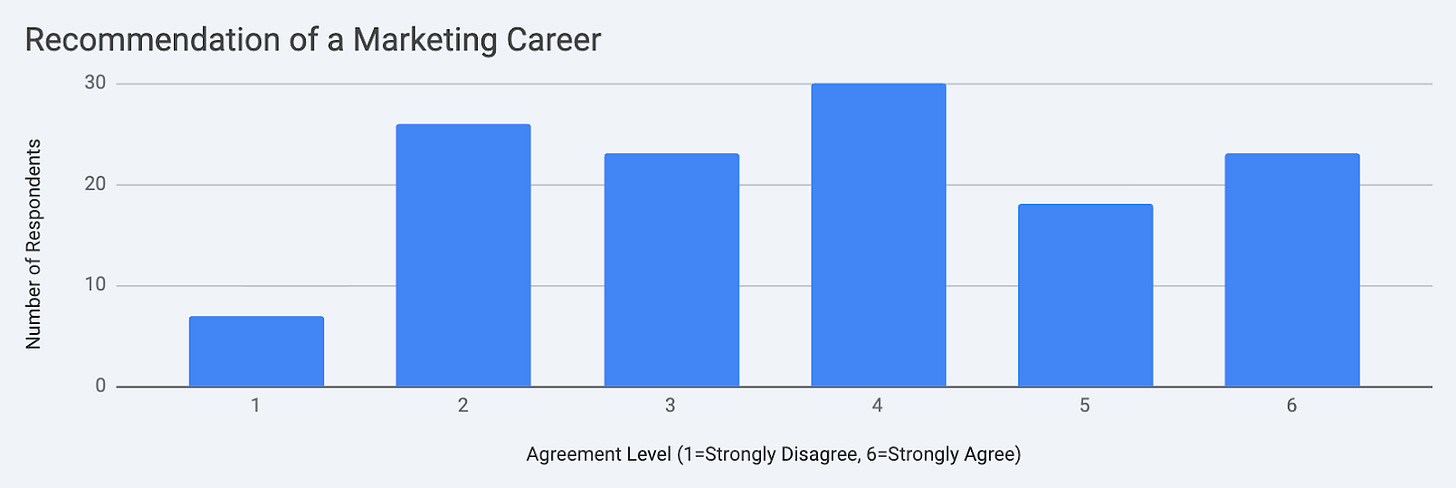The State Of Marketing 2030 Report
Marketing Unfiltered #48 How CMOs Are Predicting & Building For The Future
Good morning, and welcome to edition #48 of the Marketing Unfiltered Newsletter!
This week, we have something extra special for you. In conjunction with our friends at The CMO Circle and supported by Customer.io, we’re delighted to bring you ‘The State of Marketing 2030 Report’!
We surveyed 130 senior marketing leaders and asked them what they thought the future of our industry looked like. Would it be a hellish whirlpool taking them into eternal damnation or would the Age of AI herald a new, hitherto unseen dawn, a future in which marketers are more influential` and (whisper it…) valued in the long term?
Respondents told us that while they’re excited about new technologies, they remain concerned about career longevity and job stability.
We also discovered that 66% of marketers believe AI will make most tactical decisions by 2030 - make of that what you will…
You can read a more detailed analysis below, focusing on key trends and insights.
Many thanks again to our wonderful partners in this little venture, The CMO Circle and Customer.io.
Cheers,
Harry & Danny
Highlights of the Report
AI’s Transformative Role in Marketing
There’s a clear expectation that AI will significantly impact marketing, particularly in tactical, analytical and creative aspects, with a strong focus on efficiency and automation.
Career Outlook and Job Security in Marketing
While there’s a willingness to recommend a marketing career, concerns about job longevity and stability exist, possibly influenced by the rapid changes in the industry.
Brand vs. Performance
The oldest debate in marketing lives on, with the many respondents believing that brand building will become even more critical in the AI Search era, with performance marketing roles evolving or merging as a result.
Top 10 Takeaways from The State Of Marketing 2030 Report
AI’s Impact on Marketing Roles
Marketing leaders expect many junior roles and those involving repetitive workflows will be redefined due to AI, while strategic and creative roles will become more important.
Efficiency and Speed
The most cited value of AI is increased efficiency, speed, and automation—freeing up time for strategic thinking and creativity.
Brand vs. Performance
There’s a strong belief amongst respondents that brand building will become even more critical, with performance marketing roles reshaping or consolidating. This cohort, raised during performance marketing’s boom, now warns that “performance without brand focus” stalls long-term growth, even as some performance advocates bet on AI to keep CPAs low.
Channel Shifts
Traditional channels like SEO, PPC, and print are expected to decline, while social, influencer, events, community, content and AI-powered search are predicted to grow in response to how LLMs source their data.
Job Longevity Concerns
Many marketers worry about the longevity of their roles, with frequent concerns about ageism in the industry, and the need to rapidly upskill with new technologies, including in AI
AI-Specific Roles Emerging
New roles such as AI prompt engineers, AI managers, and creative strategists are expected to be created, focusing on leveraging AI tools as part of the wider marketing workflow.
Marketing’s Influence in the C-Suite
Marketing’s influence in executive decision-making is seen as variable, with some reporting high influence and others feeling it’s undervalued.
Budget Expectations
Most respondents expect marketing budgets to increase, especially for AI and brand investment, but some anticipate flat or reduced budgets due to efficiency gains.
Human Connection Still Matters
Despite automation, channels that foster real human interaction (events, communities, IRL meetups) are seen as increasingly valuable.
Strategic Alignment
There’s a recurring theme that to be successful, marketing must ensure they are more closely aligned with the broader strategic functions, especially product and sales.
Channels Expected to Increase in Importance
The 130 CMOs and marketing leaders surveyed believe the following channels will gain importance:-
GEO (13 mentions)
Events (7 mentions)
Partnerships (6 mentions)
Social (5 mentions)
OOH (Out-of-Home) (5 mentions)
Channels Expected to Decrease in Importance
Conversely, CMOs anticipate a decline in the importance of these channels:-
SEO (19 mentions)
TV (8 mentions)
PPC (7 mentions)
Email (7 mentions)
Print (5 mentions)
Let’s delve into the details from the Marketing Report 2030 Survey
The Audience:
The Marketing leaders all had at least 10 years of Marketing experience with over ⅔ with at least 20 years in the trade. 40% are working in B2B and 60% in B2C. 44% of these leaders enjoy their job more than they did at the early stages of their career with only 20% disagreeing with this statement.
Interestingly only 55% of these marketing leaders would actively recommend going into marketing as a career.
This begs the question: Is this partly because the old marketing career ladder doesn’t fit the new model and we need to start thinking about marketing roles in a different way?
There was an overwhelming vote against the sentiment that marketing was a diminishing function and should sit within sales with 90% disagreement.
Over 70% are concerned about the longevity of their marketing career. This was reflected in a talk at MADfest where Darain Faraz highlighted that the marketing industry, seen as synonymous with fresh perspectives and digital savvy, can inadvertently marginalise older professionals.
Darain referenced a great scene in Skyfall where Bond meets the new Q. Q challenges Bond, saying:-
“Age is no guarantee of efficiency…”
To which Bond responds
“…and youth is no guarantee of innovation.”
66% don’t expect to be in the same job in 2 years which could be both a positive or negative view from the respondents. Is this driven by new and exciting opportunities both within or outside of the function or from market instability and concerns about the changing role of marketing within businesses.
Despite this marketing leaders do skew towards seeing the function gaining or maintaining its influence and priority within organisations. This aligns with the recent report from McKinsey on how bringing the CMO up front and aligning with the CEO and CFO can drive sustainable growth.
There is positive sentiment towards the benefits of AI with over 70% believing AI will be managing much of the creative work by 2030 and 60% most of the tactical decision making.
The knock on effect of this increase in efficiency and automation is that ⅔ of marketing leaders think their marketing budgets will decrease over the next 2 years which could be across headcount, agencies and/or channel spend.
The benefit being that more time can be spend on strategic, brand and creative work with almost 90% having a strong belief that investing in both brand and performance will be more successful.
And there was some sage advice for CEOs from our leaders with the following feedback being most cited:
Marketing needs to be viewed as a Strategic Growth Engine, Not a Cost Center with a seat at the leadership table and influence across product, sales, and strategy decisions.
Brand + Performance Must Be Balanced with overemphasis on performance without brand harming long-term value. The view was that brand is even more critical in a world where AI and new channels can compress differentiation.
CEOs must understand a company’s story, USP, purpose, and how that translates into brand identity with authenticity.
Hiring good people remains foundational. The right marketing talent (strategy + execution, data + creativity) can’t be substituted.
Organisations must rethink structure: how to embed marketing and AI across functions (Product, Sales, R&D).
An experimentation mindset with AI is critical adopting a test & learn mindset to see where it can really have impact.
It’s no surprise that AI is such a hot topic for senior marketers but the State Of Marketing 2030 report’s findings shine a light on exactly how influential people see these new technologies being across every facet of marketing.
Jason Lyman, CMO at Customer.io shares the positivity noted by senior marketers in the report:-
“This report offers a fascinating look at how senior marketers are envisioning the post-AI world. What stands out most is the sense of optimism and excitement about the opportunities these technologies create for marketing. At Customer.io, we’re proud to be a partner in helping marketers navigate and shape this new era of discovery.”
James Hamlin, co-founder of The CMO Circle gave his appraisal on the State of Marketing report:-
“Performance channels will keep shifting, but brand and community will always matter. Marketers who invest in building strong brands and real connections with their audiences will be the ones who thrive in 2030”.
Nicola Anderson, co-founder of The CMO Circle and Partner at Growth&Company believes that
“As we adapt to understanding the role that AI can play in both marketing and the wider business it’s critical that leadership teams stay laser focused on the customer with clarity on how they stand out and differentiate from the alternatives. To achieve this it’s essential to balance investment across performance and brand to build a long term sustainable business.
Many thanks for reading and subscribing to Marketing Unfiltered and thanks again to our friends at our friends at The CMO Circle and Customer.io for their help and support with the pulling together State of Marketing 2030 Report.
If you have any feedback or would like to contribute an article, just hit reply or hit the links below to chat with us.
Cheers,
Danny & Harry
Marketing Unfiltered By Danny Denhard & Harry Lang
Danny Denhard » If you need help 🚨: I coach leaders, consult with startups, marketplaces and challenger brands and advise companies looking to grow, so get in touch.
Harry Lang » Harry is a CMO and performance marketing/ brand strategy consultant who grows digital B2C businesses for fun. You can connect with him on LinkedIn or email him at Harry@BrandArchitects.co.uk





